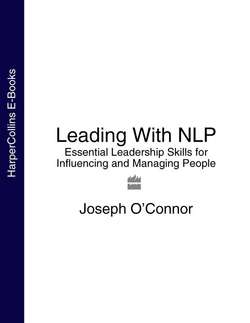Читать книгу Leading With NLP: Essential Leadership Skills for Influencing and Managing People - Joseph O’Connor - Страница 23
Example
ОглавлениеExample is the third pillar of leadership, and the strongest. People look to a leader for ideas and guidance, and the strongest message comes not from what you say, but who you are.
A leader who acts as a role model takes responsibility for what they do. Responsibility is a double-edged word – the ability to respond is one edge, the recognition of your influence the other. Influence and responsibility go together. Your self, values, beliefs, expectations and actions enter everything you do and affect everything you do, and if you pay attention to your experience, then what you do affects you and changes you and the people with you. A responsible and effective leader does not think of themselves in isolation. They are part of the team they lead. This means that they lead and influence both themselves and others.
In order for leaders to act as role models and lead by example they have to be true to themselves. In doing this, they give us the message not to be like them, but to be ourselves, a message we all recognize. And in being true to ourselves we are developing our own leadership qualities, moving further along the path of leadership.
Being a leader is not always easy, though, and there are no facile answers. Most choices are vague, fuzzy and cannot be logically argued one way or another. I have a favourite Sufi story about the holy man Nassr-U-Din presiding as a judge in a civil court where two people were disputing a grievance. The first man argued his case very eloquently.
‘That was very convincing!’ said Nassr. ‘You are obviously right!’
‘A moment, sir,’ whispered the clerk of the court. ‘You must wait for the other man to argue his case before deciding.’
The second defendant took the stand and presented his case no less eloquently.
‘Of course!’ said Nassr. ‘I must have been blind. Now I see that you are right!’
The clerk pulled at his sleeve. ‘But my lord,’ he hissed, ‘they can’t both be right!’
‘No,’ said Nassr. ‘You’re right.’
Sometimes both ways seem right and yet we have to choose one or the other – a difficult decision. In such cases we have to follow what we trust. The word ‘trust’ comes from the same root as the word ‘truth’. Truth for each of us is what we trust. If we do not trust ourselves, then ‘truth’ becomes what others tell us. Ultimately, leadership means trusting yourself and developing others to trust themselves. People do not trust those who do not trust themselves.
